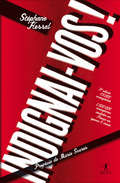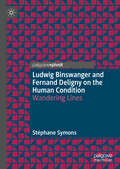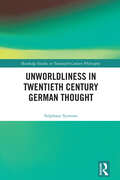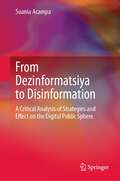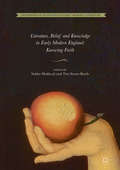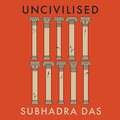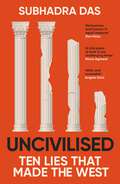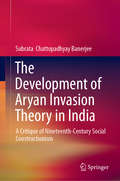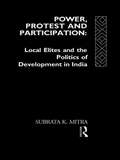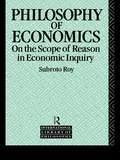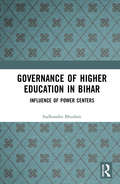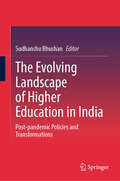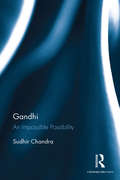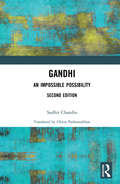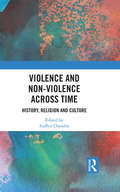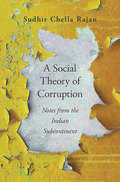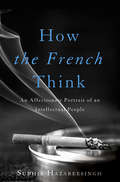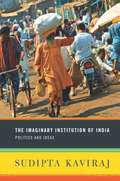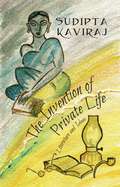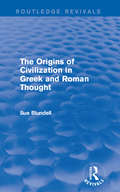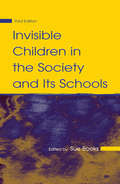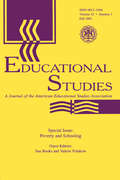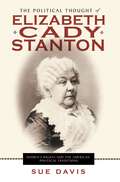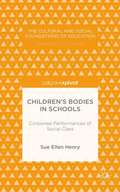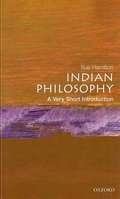- Table View
- List View
Indignai-vos
by Stéphane Hessel1.500.000 exemplares vendidos em França em apenas 5 meses. «Um pequeno grande livro, com ideias inovadoras e críticas certeiras»Mário Soares «A minha longa vida deu me uma série de motivos para me indignar.» Quem o escreve é Stéphane Hessel, herói da Resistência francesa, sobrevivente dos campos de concentração nazis e um dos redactores da Declaração Universal dos Direitos Humanos. É com a autoridade moral de um resistente inconformado e de um lutador visionário que Stéphane Hessel nos alerta, neste breve manifesto, para o facto de existirem hoje tantos e tão sérios motivos para a indignação como no tempo em que o nacional-socialismo ameaçava o mundo livre. Se procurarmos, certamente encontraremos razões para a indignação: o fosso crescente entre muito pobres e muito ricos, o estado do planeta, o desrespeito pelos imigrantes e pelos direitos humanos, a ditadura intolerável dos mercados financeiros, a injustiça social, entre tantos outros. Aceitemos o desafio de Stéphane Hessel, procurando neste livro e no mundo que nos rodeia os motivos para a insurreição pacífica, pois «cabe-nos a todos em conjunto zelar para que a nossa sociedade se mantenha uma sociedade da qual nos orgulhemos».
Ludwig Binswanger and Fernand Deligny on the Human Condition: Wandering Lines
by Stéphane SymonsPhilosophical thinking allows itself to be nourished by seemingly non-committal exercises of thought but at the same time seeks forms of irrefutable knowledge. Because of this focus on both the subjective and the universal, philosophy also falls for the lure of the “what-if?” question. What if two legendary artists, writers or philosophers, who did not know each other, did enter into a conversation? In this book, Stéphane Symons outlines an (im)possible conversation between Swiss psychiatrist and philosopher Ludwig Binswanger (1881-1966) and French educator, philosopher, poet and filmmaker Fernand Deligny (1913-1996). Although the two never met, this imaginary conversation can offer insight into both authors' thinking and the human condition. According to Binswanger, self-awareness and social consciousness are the most important and characteristic features of human beings. In contrast, from his contacts with children and adolescents with autism, Deligny emphasizes our ability to interact with the material environment, especially with seemingly insignificant things and nature. Bringing the two thinkers into conversation, Symons sheds new light on what it is to be truly human. In the process, leading roles are played by one of Binswanger's patients, Ellen West, and a young boy with autism, Janmari.
Unworldliness in Twentieth Century German Thought (Routledge Studies in Twentieth-Century Philosophy)
by Stéphane SymonsWhat happens when the world around us feels fragmented? How can a person continue to respond positively to their environment when it seems to have lost its internal coherence? These questions lie at the heart of this innovative interpretation of some of the most influential German philosophers of the twentieth century. The key figures in this study are the young Georg Lukács (1885–1971), Ernst Jünger (1895–1998), Ernst Bloch (1885–1977), Theodor Adorno (1903–1969), Max Kommerell (1902–1944), and Siegfried Kracauer (1889–1966).By establishing an intellectual dialogue among these otherwise diverse thinkers, this study identifies a common interest: the question whether an unworldly, fragmented universe can nonetheless elicit a creative response from individuals. Together, these authors offer an alternative to what is considered the dominant trend in twentieth-century German philosophy: the phenomenological emphasis on humans' lived interactions with a shared and unified lifeworld. Special attention is given to six distinct interpretations of Miguel de Cervantes's novel Don Quixote and the unworldly actions of its main character.Unworldliness in Twentieth Century German Thought will appeal to researchers and advanced students interested in twentieth-century continental philosophy, German intellectual history, critical theory, and literature and philosophy.
From Dezinformatsiya to Disinformation: A Critical Analysis of Strategies and Effect on the Digital Public Sphere
by Suania AcampaThe book takes a critical look at the phenomenon of disinformation by identifying the historical, technological and human elements that contribute to the current success of disinformation strategies. The author examines the origin of the word "Dezinformatsiya", used by Russian planners in the 1950s, to understand how military strategy has transformed into militarization of information. The book pays particular attention to the power of algorithmic platforms on the selection and dissemination of digital content and their role in the spread of misinformation. This influences traditional editorial practices, disintermediating the production and distribution of news and amplifying a particular human cognitive mechanism: confirmation bias. The author investigates the Italian case to identify general archetypes, and typical and salient elements of disinformation strategies. The results offer a further interpretative aspect to studying disinformation, which represents a fracture in the digital public sphere, a kind of irrational object circulating in a space believed to be governed by rational engagement norms. The book conclusively shows how polarizing narratives used in disinformation strategies are the expression of complex ideological undergrowth embodied in extremes of the political spectrum. This highly topical book is for students and researchers from across the social sciences and media interested in the disinformation phenomenon.
Literature, Belief and Knowledge in Early Modern England: Knowing Faith (Crossroads Of Knowledge In Early Modern Literature Ser. #1)
by Subha Mukherji Tim Stuart-ButtleThe primary aim of Knowing Faith is to uncover the intervention of literary texts and approaches in a wider conversation about religious knowledge: why we need it, how to get there, where to stop, and how to recognise it once it has been attained. Its relative freedom from specialised disciplinary investments allows a literary lens to bring into focus the relatively elusive strands of thinking about belief, knowledge and salvation, probing the particulars of affect implicit in the generalities of doctrine. The essays in this volume collectively probe the dynamic between literary form, religious faith and the process, psychology and ethics of knowing in early modern England. Addressing both the poetics of theological texts and literary treatments of theological matter, they stretch from the Reformation to the early Enlightenment, and cover a variety of themes ranging across religious hermeneutics, rhetoric and controversy, the role of the senses, and the entanglement of justice, ethics and practical theology. The book should appeal to scholars of early modern literature and culture, theologians and historians of religion, and general readers with a broad interest in Renaissance cultures of knowing.
Uncivilised: Ten Lies that Made the West
by Subhadra DasSome things are a given. The value of a good education. Time's progress. Death.Except most of the ideas that form Western Civilisation are just that - ideas. Taking cues from Greek philosophy and honed in the Enlightenment, certain notions about humanity and human society grew into the tenets we live by, and we haven't questioned them a great deal since. But isn't it time we asked who really benefits from the values at the core of our society? How much truth lies in a science that conjured up 'race'? Who do laws and nations really protect? Why does it feel like time is money? What even is 'art'?And the real question - is the West really as 'civilised' as it thinks it is?This audiobook will put everything back on the table and ask listeners to reconsider what they thought they knew about civilisation. Taking 10 core values of Western Civilisation in turn, it will examine the root of the idea, how it developed, and how it's impacted the way we live. Most importantly it will reveal how each of these ideas was either created in opposition to another group of people, or based on ideas they had first (and better). (Un)civilised will ask listeners to open their eyes to the why behind how they think the world works.(P) 2024 Hodder & Stoughton Limited
Uncivilised: Ten Lies that Made the West
by Subhadra DasPre-order the enthralling and radical book that overturns our assumptions about civilisation and society'A witty and accessible survey of the shortcomings of western civilisation as many people imagine it' ANGELA SAINI, author of Superior'A vital piece of work in our challenging times that reminds us of the rich history and influences outside the West. Das writes with passion and humour to open our eyes to the history that has shaped our world' ROMA AGRAWAL, author of Built and Nuts and Bolts___________Some things are a given: knowledge is power, time is money, justice is blind. But many of the big ideas that underpin Western civilisation are just that - ideas. Taking cues from Greek philosophy and honed in the Enlightenment, certain notions about humanity and society grew into the tenets we still live by today, and we haven't questioned them a great deal since.But what if they're not just ideas? What if they're outright lies? Isn't it time we asked who really benefits from the values at the core of our society? What is unbiased about a science that conjured up 'race'? Who do laws and nations actually protect? What even is 'art'? And the real question: is the West really as 'civilised' as it thinks it is?Uncivilised puts everything back on the table and asks readers to reconsider what they thought they knew about civilisation, starting with the ten lies that have shaped their lives.
The Development of Aryan Invasion Theory in India: A Critique of Nineteenth-Century Social Constructionism
by Subrata Chattopadhyay BanerjeeThis book delves deep into the Social Construction of Theory, comparative epistemology and intellectual history to stress the interrelationship between diverse cultures during the colonial period and bring forth convincing evidence of how the 19th century was shaped. It approaches an interesting relation between the linguistic studies of 19th century’s scientific world and subsequent widespread acceptance of the empirically weak theory of the Aryan invasion. To show entangled history in a globalized world, the book draws on the Aryan Invasion Theory to highlight how different socio-religious parties commonly shape a new theory. It also explores how research is affected by the so-called social construction of theory and comparative epistemology, and deals with scholarly advancement and its relation with contemporary socio-political demands. The most significant conclusion of the book is that academic studies are prone to comparative epistemology, even under the strict scrutiny of the so-called scientific methods.
Power, Protest and Participation: Local Elites and Development in India
by Subrata K. MitraThe attitudes of local elites - the hinge between Indian state and rural society - towards protest and participation in development. Illuminates arguments about the nature of the state as well as the development process.
The Philosophy of Economics: On the Scope of Reason in Economic Inquiry (International Library of Philosophy)
by Subroto RoyThe first work to seriously and successfully bridge twentieth century economics and philosophy. Subroto Roy draws these two disciplines together and examines the intellectual roots of economics.
Governance of Higher Education in Bihar: Influence of Power Centers
by Sudhanshu BhushanThis book presents the state-specific dimensions of the governance of higher education in Bihar, India, based on a real-case perspective. It discusses the policies of the center and state governments, and their implications on the state's higher education system. It addresses the issues and challenges faced by the higher education sector from the point of view of multiple stakeholders at center, state, university and college levels, while examining influential power centers. The volume focuses on select universities in the state and looks at how they manage policies, schemes and regulations. It deals with key themes such as the role of state and regulatory bodies such as the University Grants Commission; the balance of power; resource scarcity; the inadequacy of top-down governance models; governance failure; and the autonomy of universities. It explores the conflict between the politics and economics of governance and efficiency; the promotion and recruitment of senior office-bearers and teachers; the privatization of colleges; and financing, admission and examination systems. Through an in-depth study using empirical unit-level data from the All-India Survey of Higher Education, examples and theoretical frameworks, the book analyzes the reasons for the underperformance of the governance system of higher education in Bihar. It also offers suggestions and policy recommendations to help improve its planning and management via participative and responsible governance and informed institutional leadership. This book will be of interest to students, teachers and researchers of education, higher education, economics, governance and public administration, and development studies. It will also be useful to educationists and experts, education administrators, policymakers, bureaucrats and the governing bodies of higher education institutions.
The Evolving Landscape of Higher Education in India: Post-pandemic Policies and Transformations
by Sudhanshu BhushanThe edited volume discusses the long period of post-colonial developments in higher education in India. It examines the legitimacy of the policies pursued post-pandemic with a focus on the role of teachers and the students' voices. It addresses the essential question of how the technological ascendance in higher education addresses social justice. What is the role of teachers in a new landscape of higher education? It offers insights into the efficiency-centric proposition of the state-market-technology triad, the current paradigm of higher education worldwide. It presents evidence to understand how efficiency has a tradeoff with various aspects of social justice. The authors deal with questions, such as the challenges of privatization and how the commodification of higher education runs counter to the idea of inclusive higher education. The authors critically look at the online form of higher education and how it has led to the shrinkage of democratic spaces in higher education. It discusses the transformative role of teachers with increasing managerialism of higher education. The book highlights a deep understanding of the increasing role of the market and technology and their influence in negating an inclusive and democratic public space in higher education. It appeals to teachers and students by enabling them to understand the market's and technology's impacts on higher education. It has the potential to be a reference book in colleges and universities. It will help the large community of practitioners and policymakers guard against the dangers of overt marketization. The book benefits policymakers, university administrators and teachers, and researchers of higher education interested in governance, technology, teaching, and research in higher education.
Gandhi: An Impossible Possibility
by Sudhir ChandraFor a man who made such a powerful intervention in the history of the 20th century, many of Mahatma Gandhi’s ideas were misunderstood or obfuscated during his lifetime. This book draws our attention to Gandhi’s last years, particularly the marked change in his understanding of the acceptance of non-violence by Indians. It points to a startling discovery Gandhi made in the years preceding India’s Independence and Partition: the struggle for freedom which he had all along believed to be non-violent was in fact not so. He realised that there was a causal relationship between the path of illusory ahimsa which had held sway during the freedom struggle and the violence that erupted thereafter during Partition. Calling for a serious rethink on the very nature and foundation of modern India, this book throws new light on Gandhian philosophy and its far-reaching implications for the world today. It will interest not only scholars and researchers of modern Indian history, politics, and philosophy but also lay readers.
Gandhi: An Impossible Possibility
by Sudhir ChandraGandhi was perhaps the most influential yet misunderstood figure of the twentieth century. Drawing close attention to his last years, this book explores the marked change in his understanding of the acceptance of non-violence by Indians. It points to a startling discovery Gandhi made in the years preceding India’s Independence and Partition: the struggle for freedom which he had all along believed to be non-violent was in fact not so. He realised that there was a causal relationship between the path of illusory ahimsa, which had held sway during the freedom struggle, and the violence that erupted thereafter during Partition. In the second edition of this much-acclaimed volume, Chandra revisits Gandhi’s philosophy to explain how and why the phenomenon of the Mahatma has been understood and misunderstood through the years. Calling for a rethink of the very nature and foundation of modern India, this book throws new light on Gandhian philosophy and its far-reaching implications for the world today. It will interest not only scholars and researchers of modern Indian history, politics and philosophy, but also lay readers.
Violence and Non-Violence across Time: History, Religion and Culture
by Sudhir ChandraThis book probes the complex interweaving, across time and cultures, of violence and non-violence from the perspective of the present. One of the first of its kind, it offers a comprehensive examination of the interpenetration of violence and non-violence as much in human nature as in human institutions with reference to different continents, cultures and religions over centuries. It points to the present paradox that even as violence of unprecedented lethality threatens the very survival of humankind, non-violence increasingly appears as an unlikely feasible alternative. The essays presented here cover a wide cultural–temporal spectrum — from Vedic sacrifice, early Jewish–Christian polemics, the Crusades, and medieval Japan to contemporary times. They explore aspects of the violence–non-violence dialectic in a coherent frame of analysis across themes such as war, jihad, death, salvation, religious and philosophical traditions including Buddhism, Christianity, Judaism, Hinduism, Islam, mysticism, monism, and Neoplatonism, texts such as Ramayana, Mahabharata and Quran, as well as issues faced by Dalits and ethical imperatives for clinical trials, among others. Offering thematic width and analytical depth to the treatment of the subject, the contributors bring their disciplinary expertise and cultural insights, ranging from the historical to sociological, theological, philosophical and metaphysical, as well as their sensitive erudition to deepening an understanding of a grave issue. The book will be useful to scholars and researchers of history, peace and conflict studies, political science, political thought and cultural studies, as well as those working on issues of violence and non-violence.
A Social Theory of Corruption: Notes From The Indian Subcontinent
by Sudhir Chella RajanA social theory of grand corruption from antiquity to the twenty-first century.In contemporary policy discourse, the notion of corruption is highly constricted, understood just as the pursuit of private gain while fulfilling a public duty. Its paradigmatic manifestations are bribery and extortion, placing the onus on individuals, typically bureaucrats. Sudhir Chella Rajan argues that this understanding ignores the true depths of corruption, which is properly seen as a foundation of social structures. Not just bribes but also caste, gender relations, and the reproduction of class are forms of corruption.Using South Asia as a case study, Rajan argues that syndromes of corruption can be identified by paying attention to social orders and the elites they support. From the breakup of the Harappan civilization in the second millennium BCE to the anticolonial movement in the late nineteenth and early twentieth centuries, elites and their descendants made off with substantial material and symbolic gains for hundreds of years before their schemes unraveled.Rajan makes clear that this grander form of corruption is not limited to India or the annals of global history. Societal corruption is endemic, as tax cheats and complicit bankers squirrel away public money in offshore accounts, corporate titans buy political influence, and the rich ensure that their children live lavishly no matter how little they contribute. These elites use their privileged access to power to fix the rules of the game—legal structures and social norms—benefiting themselves, even while most ordinary people remain faithful to the rubrics of everyday life.
How The French Think: An Affectionate Portrait Of An Intellectual People
by Sudhir HazareesinghIn France, perhaps more so than anywhere else, intellectual activity is a way of life embraced by the majority of society, not just a small group of élite thinkers. And because French thought has also shaped the Western world, Sudhir Hazareesingh argues in How the French Think, we cannot hope to understand modern history without first making sense of the French mind-set. Hazareesingh traces the evolution of French thought from Descartes and Rousseau to Sartre and Derrida. In the French intellectual tradition, he shows, recurring themes have pervaded nearly every aspect of French life, from the rhetorical flair once embodied by the philosophes to the country’s modern embrace of secularism. Sweeping aside generalizations and easy stereotypes, Hazareesingh offers an erudite portrait of the venerated tradition of French thought and the people who embody it.
The Imaginary Institution of India: Politics and Ideas
by Sudipta KavirajFor decades Sudipta Kaviraj has worked with and improved upon Marxist and subaltern studies, capturing India's social and political life through its diverse history and culture. While this technique has been widely celebrated in his home country, Kaviraj's essays have remained largely scattered abroad. This collection finally presents his work in one convenient volume and, in doing so, reasserts the brilliance of his approach.As evidenced in these essays, Kaviraj's exceptional strategy positions Indian politics within the political philosophy of the West and alongside the perspectives of Indian history and indigenous political thought. Studies include the peculiar nature of Indian democracy; the specific aspects of Jawaharlal Nehru's and Indira Gandhi's regimes; political culture in independent India; the construction of colonial power; the relationship between state, society, and discourse; the structure of nationalist discourse; language and identity formation in Indian contexts; the link between development and democracy, or democratic functioning; and the interaction among religion, politics, and modernity in South Asia. Each of these essays explores the place of politics in the social life of modern India and is powered by the idea that Indian politics is plastic, reflecting and shaping the world in which people live.
The Invention of Private Life: Literature and Ideas
by Sudipta KavirajThe essays in this volume, which lie at the intersection of the study of literature, social theory, and intellectual history, locate serious reflections on modernity's complexities in the vibrant currents of modern Indian literature, particularly in the realms of fiction, poetry, and autobiography. Sudipta Kaviraj shows that Indian writers did more than adopt new literary trends in the nineteenth and twentieth centuries. They deployed these innovations to interrogate fundamental philosophical questions of modernity. Issues central to modern European social theory grew into significant themes within Indian literary reflection, such as the influence of modernity on the nature of the self, the nature of historicity, the problem of evil, the character of power under the conditions of modern history, and the experience of power as felt by an individual subject of the modern state. How does modern politics affect the personality of a sensitive individual? Is love possible between intensely self-conscious people, and how do individuals cope with the transience of affections or the fragility of social ties? Kaviraj argues that these inquiries inform the heart of modern Indian literary tradition and that writers, such as Bankimchandra Chattopadhyay, Rabindranath Tagore, and Sibnath Sastri, performed immeasurably important work helping readers to think through the predicament of modern times.
The Origins of Civilization in Greek and Roman Thought (Routledge Revivals)
by Sue BlundellIt has been much disputed to what extent thinkers in Greek and Roman antiquity adhered to ideas of evolution and progress in human affairs. Did they lack any conception of process in time, or did they anticipate Darwinian and Lamarckian hypotheses? The Origins of Civilization in Greek and Roman Thought, first published in1986, comprehensively examines this issue. Beginning with creation myths – Mother Earth and Pandora, the anti-progressive ideas of the Golden Age, and the cyclical theories of Orphism – Professor Blundell goes on to explore the origins of scientific speculation among the Pre-Socratics, its development into the teleological science of Aristotle, and the advent of the progressivist views of the Stoics. Attention is also given to the ‘primitivist’ debate, involving ideas about the noble savage and reflections of such speculation in poetry, and finally the relationship between nature and culture in ancient thought is investigated.
Invisible Children in the Society and Its Schools (Sociocultural, Political, and Historical Studies in Education)
by Sue BooksThe authors in this book use the metaphors of invisibility and visibility to explore the social and school lives of many children and young people in North America whose complexity, strengths, and vulnerabilities are largely unseen in the society and its schools. These “invisible children” are socially devalued in the sense that alleviating the difficult conditions of their lives is not a priority—children who are subjected to derogatory stereotypes, who are educationally neglected in schools that respond inadequately if at all to their needs, and who receive relatively little attention from scholars in the field of education or writers in the popular press. The chapter authors, some of the most passionate and insightful scholars in the field of education today, detail oversights and assaults, visible and invisible, but also affirm the capacity of many of these young people to survive, flourish, and often educate others, despite the painful and even desperate circumstances of their lives. By sharing their voices, providing basic information about them, and offering thoughtful analysis of their social situation, this volume combines education and advocacy in an accessible volume responsive to some of the most pressing issues of our time. Although their research methodologies differ, all of the contributors aim to get the facts straight and to set them in a meaningful context. New in the Third Edition: Chapters retained from the previous edition have been thoroughly revised and updated, and five totally new chapters have been added on the topics of:*young people pushed into the “school-to-prison” pipeline; *the “environmental landscape” of two out-of-school Mexican migrant teens in the rural Midwest;*the perceptions and practices, in and outside schools, that construct African American boys as school failures;*negative portrayals of blackness in the context of understanding the “collateral damage of continued white privilege”; and *working-class pregnant and parenting teens’ efforts to create positive identities for themselves. Of interest to a broad range of researchers, students, and practitioners across the field of education, this compelling book is accessible to all readers. It is particularly appropriate as a text for courses that address the social context of education, cultural and political change, and public policy, including social foundations of education, sociology of education, multicultural education, curriculum studies, and educational policy.
Poverty and Schooling: A Special Issue of Educational Studies
by Valerie Polakow Sue BooksFirst published in 2001. Routledge is an imprint of Taylor & Francis, an informa company.
The Political Thought of Elizabeth Cady Stanton: Women's Rights and the American Political Traditions
by Sue Davis2009 Choice Outstanding Academic TitleElizabeth Cady Stanton (1815-1902) was not only one of the most important leaders of the nineteenth century women’s rights movement but was also the movement’s principal philosopher. Her ideas both drew from and challenged the conventions that so severely constrained women’s choices and excluded them from public life.In The Political Thought of Elizabeth Cady Stanton, Sue Davis argues that Cady Stanton’s work reflects the rich tapestry of American political culture in the second half of the nineteenth century and that she deserves recognition as a major figure in the history of political ideas. Davis reveals the way that Cady Stanton’s work drew from different political traditions ranging from liberalism, republicanism, inegalitarian ascriptivism, and radicalism. Cady Stanton’s arguments for women’s rights combined approaches that in contemporary feminist theory are perceived to involve conflicting strategies and visions. Nevertheless, her ideas had a major impact on the development of the varieties of feminism in the twentieth century. Thoroughly researched and engagingly written, The Political Thought of Elizabeth Cady Stanton draws on a wide variety of primary and secondary sources and promises to fill a gap in the literature on the history of political ideas in the United States as well as women’s history and feminist theory.
Children’s Bodies in Schools: Corporeal Performances of Social Class
by Sue Ellen HenryBringing together sociology of the body with powerful examinations of educational theory and social class, Henry examines how children's experiences of school and pedagogy are shaped by their bodies and the ideas of social class and class identity that their bodies carry.
Indian Philosophy: A Very Short Introduction
by Sue HamiltonIndia has a long, rich, and diverse tradition of philosophical thought, spanning some two and a half millennia and encompassing several major religious traditions. This Very Short Introduction emphasizes the diversity of Indian thought, and is structured around six schools which have achieved classic status. Sue Hamilton explores how the traditions have attempted to understand the nature of reality in terms of an inner or spiritual quest, and introduces distinctively Indian concepts such as karma and rebirth. She also shows how Indian thinkers have understood issues of reality and knowledge -- issues which are also an important part of the Western philosophical tradition.
